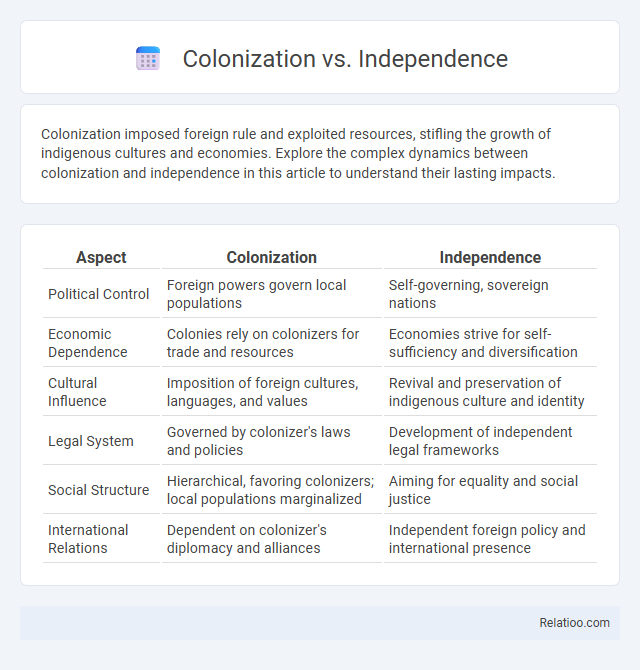Colonization imposed foreign rule and exploited resources, stifling the growth of indigenous cultures and economies. Explore the complex dynamics between colonization and independence in this article to understand their lasting impacts.
Table of Comparison
| Aspect | Colonization | Independence |
|---|---|---|
| Political Control | Foreign powers govern local populations | Self-governing, sovereign nations |
| Economic Dependence | Colonies rely on colonizers for trade and resources | Economies strive for self-sufficiency and diversification |
| Cultural Influence | Imposition of foreign cultures, languages, and values | Revival and preservation of indigenous culture and identity |
| Legal System | Governed by colonizer's laws and policies | Development of independent legal frameworks |
| Social Structure | Hierarchical, favoring colonizers; local populations marginalized | Aiming for equality and social justice |
| International Relations | Dependent on colonizer's diplomacy and alliances | Independent foreign policy and international presence |
Understanding Colonization: Definition and Historical Context
Colonization refers to the process by which a foreign power establishes control over a territory, exploiting its resources and imposing political dominance, often leading to cultural assimilation and economic dependency. Historically, colonization involved European powers expanding their empires across Africa, Asia, and the Americas from the 15th century onward, profoundly altering indigenous societies and geopolitical landscapes. Your understanding of colonization provides essential context for comprehending the subsequent independence movements and struggles that aimed to reclaim sovereignty and self-determination.
The Impacts of Colonization on Indigenous Societies
Colonization imposed drastic social, economic, and cultural disruptions on Indigenous societies, leading to loss of land, suppression of native languages, and erosion of traditional governance structures. The extraction of resources and introduction of foreign diseases decimated populations and destabilized existing communities. These impacts fueled independence struggles as Indigenous peoples sought to reclaim sovereignty, restore cultural identity, and assert political rights against colonial oppression.
Key Drivers Behind Colonial Expansion
Economic interests, such as the search for new resources and markets, were primary drivers behind colonial expansion during the 15th to 19th centuries. Strategic and geopolitical motivations, including the desire to control trade routes and expand territorial influence, further fueled colonization efforts by European powers. Cultural factors, like the spread of religion and the belief in racial superiority, also played significant roles in justifying imperial domination and sparking resistance that led to independence struggles.
Independence Movements: Seeds of Change
Independence movements ignited profound social and political transformations as colonized nations began challenging imperial rule. Your understanding of these movements highlights the emergence of national identities and the quest for self-determination through revolutions, protests, and intellectual resistance. These seeds of change ultimately reshaped global power dynamics by dismantling colonial empires and fostering new sovereign states.
Comparing Colonial Administration vs. Self-Governance
Colonial administration imposed centralized control by foreign powers, limiting local political participation and exploiting resources, while self-governance empowered indigenous populations to create policies reflecting their cultural values and economic needs. Your ability to influence laws and social structures increases significantly under self-governance, fostering national identity and economic development. The independence struggle often emerged as a response to oppressive colonial rule, aiming to transition from external domination to autonomous governance that prioritizes citizens' welfare.
Economic Transformations: Colonization vs. Independence
Colonization imposed extractive economic systems that prioritized resource exportation and labor exploitation, stunting local industries and indigenous wealth accumulation. Independence enabled Your nation to implement economic reforms aimed at diversification, industrialization, and self-sufficiency, fostering infrastructure development and domestic markets. The independence struggle often disrupted colonial economies but also galvanized nationalist movements that sought equitable economic redistribution and sustainable growth.
Cultural Identity: Erosion and Revival
Colonization often imposed foreign languages, religions, and customs, leading to the erosion of indigenous cultural identities and traditional knowledge systems. Independence struggles played a critical role in reviving suppressed cultural practices, languages, and art forms, fostering a renewed sense of national pride and unity. Post-independence efforts continue to emphasize cultural reclamation through education, preservation of heritage sites, and promotion of indigenous narratives in media and literature.
Political Structures: Control to Sovereignty
Colonization imposed centralized political structures controlled by foreign powers, disrupting indigenous governance and enforcing external authority over territories. Independence movements sought to dismantle colonial institutions, reclaim political sovereignty, and establish self-governing systems rooted in national identity. The independence struggle often involved political mobilization, resistance against colonial laws, and the creation of new constitutional frameworks to legitimize sovereign governance.
Global Consequences of Decolonization
Decolonization reshaped global political dynamics by dismantling European colonial empires, leading to the emergence of over 80 new nation-states primarily in Africa, Asia, and the Caribbean. The independence struggles often sparked internal conflicts and economic challenges, impacting global trade patterns and prompting shifts in Cold War alliances as the US and USSR sought influence over newly independent countries. These transformations accelerated calls for international cooperation, influencing the establishment and evolution of institutions like the United Nations and fostering a global dialogue on self-determination and human rights.
Contemporary Perspectives on Post-Colonial Development
Contemporary perspectives on post-colonial development analyze how the legacy of colonization continues to influence economic, political, and social structures within formerly colonized nations, emphasizing the ongoing challenges tied to inequality and governance. Your understanding of independence struggles highlights the complex process of nation-building, where collective resistance not only sought to overthrow colonial rule but also aimed to redefine identity and sovereignty in a global context. Scholars argue that true development must address the deep-rooted impacts of colonization, fostering inclusive growth and self-determination beyond mere political freedom.

Infographic: Colonization vs Independence
 relatioo.com
relatioo.com